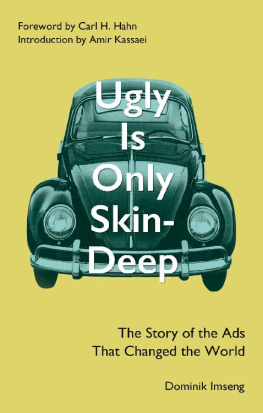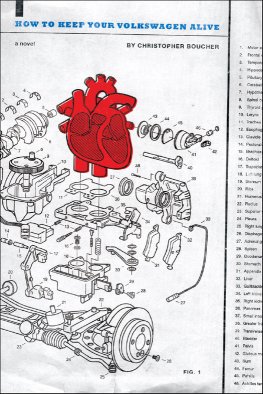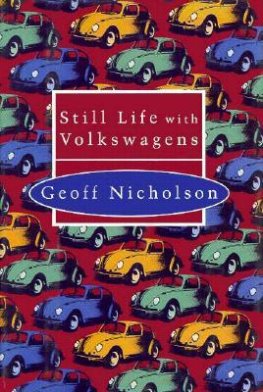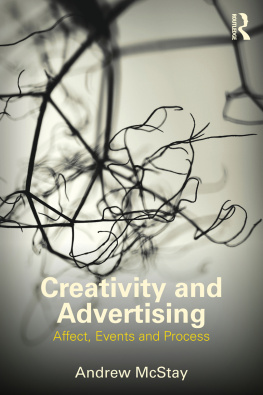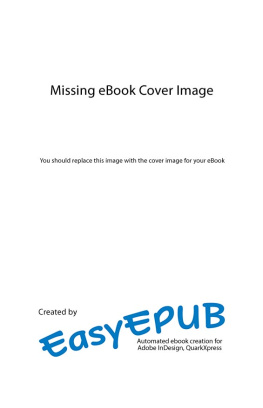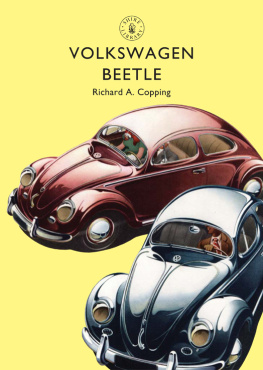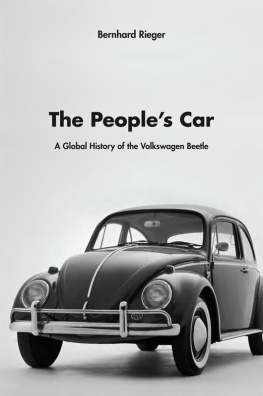Dominik Imseng is a master of oral history. His brilliant piecing together of Volkswagens classic 60s ad campaign is both illuminating and entertaining. Steven Heller, design writer and Co-Chair MFA Design/Designer as Author + Entrepreneur, School of Visual Arts, NYC
Dominik Imseng has not only given us a superbly written and well researched history of the unique DDB/VW Beetle relationship of the 1960s and 70s, he has unequivocally reminded us of that oh so brief Golden Age of Advertising when agencies and their clients enjoyed a mutually beneficial business relationship based on trust and respect, rather than inherently false pecuniary ends. Thats why Imsengs statement on the very last pages of his book rings so true in todays data-driven environment: Advertising must do more than simply try to get peoples attentionit must try to get their respect. Amen to that. Recommended reading to everyone, but particularly for those who were not even born in the age of Think small. George Parker, author of MadScam, The Ubiquitous Persuaders and Confessions of a Mad Man
Youd think that everything that could be written about the iconic VW campaign had already been written. But Dominik Imsengs book proves this wrong; he delves into the history and the connected (and frequently amusing) anecdotes with wonder and enthusiasm as if the work were a newly discovered oeuvre. I cant recommend it highly enough. Get it! Neil French, former Worldwide Creative Director of WPP and author of Sorry for the Lobsters
In the late 1950s, a handful of rebels transformed the advertising industry. They changed it from a soulless profession obsessed with numbers and blunt messages to a creative profession that produced adverts the public enjoyed consuming. In his book, Dominik Imseng has done a brilliant job of telling the stories of the misfits and geniuses behind that revolution. With any luck, it will inspire a new generation of revolutionaries. The industry appears to have gone full circle. Dave Birss, Editor at Large of The Drum and author of A User Guide to the Creative Mind
Everybody in advertising knows the great Volkswagen ads: Lemon, Think smallSnow Plow er the one with the multi-colored Beetle and er erm Dominik Imseng goes deeper, helping us understand why the Volkswagen campaign changed advertising. Dave Dye, Stuff from the Loft, www.davedye.com
In an age where the advertising industry seems to care little about the past, this forensic examination of the people and events surrounding DDBs VW campaign is a timely as well as masterful piece of work. At last we have a painstakingly assembled account of what really happened in New York half a century ago in this revolutionary agency. No to mention a clear articulation of the lessons that we would all be wise to remember as we push the advertising discipline into newer and newer territory. Richard Huntington, Chief Strategy Officer of Saatchi & Saatchi London, www.adliterate.com
If the authors command of his subject is masterful, then his ability to tell it as a story is even more impressive. There are turns of phrase and whole passages here that make my heart sing. That he does all this in Englisha language that is not his mother tongueis awe-inducing. Dominik Imseng is the Joseph Conrad of marketing literature. Steve Harrison, author of How to Do Better Creative Work and Changing the World is the Only Fit Work for a Grown Man
Whether you work in advertising or hope to, this book is filled with reminders that creative people, committed to craft, truth and storytelling, can change both an industry and the culture that surrounds it. Pure inspiration that makes you love the business all over again. Edward Boches, Professor of Advertising at Boston University and former Partner and Chief Creative Officer of Mullen Lowe
I am shocked by how few people in advertising today study advertising in a productive and methodical way. Why dont we learn from our history? From the ads that created advertising? Do yourself and your career a favor. Forgo two days worth of pretentious caffeine. Spend your money instead on Mr Imsengs surpassing book. George Tannenbaum, Ad Aged, www.adaged.blogspot.com
Damn good book. Ed McCabe, Co-Founder, President, Worldwide Creative Director of Scali, McCabe, Sloves, Inc.
Ugly Is Only Skin-Deep Copyright 2018 by Dominik Imseng. All Rights Reserved.
5
Foreword by Carl H. Hahn
In the course of its history, the Volkswagen Group has acquired merit and recognition in many areas. Less well known is that VW also triggered a revolution in the world of advertising.
It began in the summer of 1959 in a little-known ad agency called Doyle Dane Bernbach on a New York City backyard. DDB had just won the Volkswagen account to market the Beetle in the U.S., with a ridiculously small budget.
The agency managed to fascinate America with an entirely new way of advertising and redeem it from the monotony of the traditional ads of that period, which tended to show elegant ladies and gentlemen in front of expensive villas in beautiful parks. The ads for the Beetle were refreshingly different, as distinctive as the car itself: sober in appearance, almost plain, but always original and entertaining, with a dash of humor and disarming honesty. Ads like Think small or Lemon made understatement socially acceptable and gave the Beetle cult status. In 1999, Advertising Age voted Think small the best ad of the 20th century.
By collaborating with DDB, Volkswagen not only had the lowest advertising costs per vehicle, but also achieved U.S. sales that helped grow VW in a dimension previously unimaginable for a European car manufacturer. As the advertising philosophy developed for the American market was universally applicable, the campaign secured the Volkswagen Group a uniform appearance. As a result, Volkswagens product strategy, combined with Bill Bernbachs inexhaustible creativity, revolutionized the advertising world. More than half a century later, DDB still remains closely associated with Volkswagena unique collaboration in this fast-paced industry.
I am pleased that this book recalls the merits of VW in the field of advertising. It is also important for me to acknowledge the work of Doyle Dane Bernbach and not let fall into oblivion the spirit that inspired its team.
DDB has succeeded in a unique way to make the Beetle a symbol of quality and durability. The VW campaign set standards across all industries and is leading the way in the advertising world to this day.

Professor Carl H. Hahn (b. 1926) began his career at Volkswagen in 1954 as assistant to then CEO Heinrich Nordhoff. From 1959 to 1964, he was CEO of Volkswagen of America and thus the original client of the campaign presented in this book. Hahn eventually acted as CEO of the Volkswagen Group from 1982 until his retirement in 1992.

